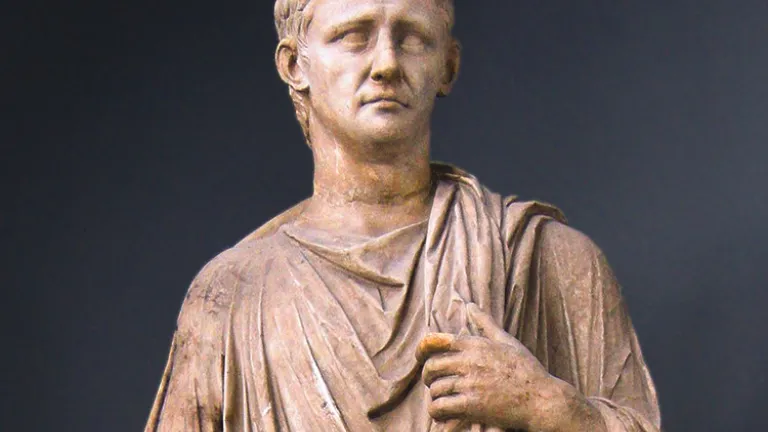How “Grace” Was Understood in the Time and Culture of the Apostles

The Greek word charis, commonly translated “grace” in our Bibles, had a specific meaning in the time and culture in which the New Testament was written. It also had a set of other words associated with it that appear many times in the Bible, particularly in the letters of the apostle Paul. Understanding what these words meant in that context aids us greatly in understanding what they should mean in the lives of Christians today.
An excellent explanation of how “grace” would’ve been understood by Paul’s readers comes from the 2012 book Misreading Scrip-ture With Western Eyes: Removing Cultural Blinders to Better Understand the Bible. Authors Randolph Richards and Brandon O’Brien describe a hypothetical but typical situation of that day (pp. 162-164):
“Imagine a young baker named Marcus in the town of Philippi. Marcus learned to bake bread from his father. The family business stretched back to the founding of Philippi five generations back. Marcus’s family was, consequently, one of the founding members of the bakers’ guild. A hundred years ago, his ancestor had retired from the Roman army . . . As a reward, his family . . . had been given Roman citizenship and land in Philippi . . .
“When his father was young . . . a fire destroyed the family bakery. Marcus’s father went to a wealthy widow, a cloth merchant who was also from the province of Lydia, to seek help. Julia Lydia loaned his father the money to rebuild the bakery. Thus began an enduring relationship. Today, Marcus sells all his bread to Lydia, including all the members of her extended household, . . . plus all her other ‘friends’ (the various merchants with whom Lydia does business). These customers give Marcus all the business he and his young sons can handle. He sells his bread at a reasonable price and his family makes a good (though modest) living. Lydia ensures that no one takes advantage of anyone . . .
“Three years ago, the barley sellers raised their prices. All the bakers panicked. Naturally, Marcus asked his patroness to help. She invited the patron of the barley merchants to dinner. During a civilized meal, Lydia mentioned her friend ‘Marcus’ and his difficult situation. The two patrons discussed how they could best help their friends, arriving at a fair price for barley flour. . . . Lydia did what was appropriate as the patron of Marcus the baker.
“Of course such relationships were two sided. Last year, one of Lydia’s slaves awakened Marcus in the middle of the night. Lydia needed a favor. She had received special guests, and she was planning an elaborate dinner party for some wealthy families of Philippi for which she needed special bread to serve at this important banquet. . . . She needed Marcus to cook something special. How could he refuse his patroness? It took all night, but he made sure the bread was ready.
“The ‘rules’ for what was expected of a patron and a client were not painted on Roman city walls. . . . The rules for the truly foundational institutions of society, like family and patronage, went without being said. Every-one knew what the proper behavior was. A good patron solved the problems of his or her clients: assisting with trade guilds, business disputes, refinancing loans and easing tensions with city elders. . . . The patron did ‘favors’ for his clients who then fell under his circle of influence and protection. In return, the client was expected to be loyal (faithful) and was sometimes asked to do things for the patron.”
In this example we see the obligations of both parties involved in the patron-client relation-ship. The client, the family of Marcus, was in desperate need. This family sought help from a generous patron who extended to the family members a priceless gift—known as charis, or “grace”—that they could never repay, enabling them to rebuild their business and lives.
Both parties understood that the one receiving charis, or grace, could never repay the gift received. But it was understood that accepting the gift created an obligation from the recipient toward the one giving the gift—that he was forever obligated to do whatever the giver asked and to always act in the giver’s best interests.
The apostle Paul uses this well-understood cultural norm and practice to help us grasp the greatness of God’s love and kindness toward us in extending to us His charis or “grace”—the forgiveness of sin, the gift of eternal life and all His other blessings.
And the other side of the coin is also evident—that in return for the priceless gift of God’s grace, we become the equivalents of God’s clients—obligated to show loyalty and faith to Him and to do whatever He asks of us. In biblical terms, this is what the Bible refers to as pistis—translated as faith or faithfulness. Like charis, Paul uses this word more than 100 times in his letters preserved for us in the Bible.
Richards and O’Brien go on to summarize the relationship between these words and what it means for a Christian’s relationship with God:
“Patronage had its own vocabulary. Words we usually consider particularly Christian terms—grace and faith—were common parlance before Paul commandeered them. The undeserved gifts of assistance the patron offered were commonly called charis (‘grace’ and ‘gift’): The loyalty the client offered the patron in response was called pistis (‘faith’ and ‘faithfulness’). Roman philosophers noted that when one received a god’s favor (charis), one should respond with love, joy and hope. When Paul sought to explain the Christian’s new relationship with God, then, one of the ways he did so was in terms of the ancient system of patronage—something everyone understood. In other words, it went without being said that relationship is the premier and determinative aspect of charis, grace” (p. 166, emphasis added).
Dr. David deSilva, professor of Greek and the New Testament and an authority on first-century culture, emphasizes the obligation of the recipient of grace to act in ways that demonstrate thankfulness and appreciation for what he or she has received. In his book An Introduction to the New Testament: Contexts, Methods and Ministry Formation, he writes:
“The greater the benefit bestowed, the greater should be the response of gratitude. In the ancient world gratitude involved first the demonstration of respect for the benefactor . . . , acting in such a way as to enhance his or her honor and certainly avoiding any course of action that would bring him or her into dishonor . . . Gratitude also involves intense personal loyalty to the patron . . . This is the level of gratitude and loyalty the New Testament authors claim should be given to Jesus and, through him, to God. “Grace,” therefore, has very specific meanings for the authors and readers of the New Testament . . .” (2018, pp. 103-104).
Dr. DeSilva continues: “The proper response toward a patron is gratitude: offering honor, loyalty, testimony, and service to the patron. God’s favor seeks a response of faithfulness (pistis) and service from God’s clients. Paul speaks, for example, of the “obedience of faith” (Rom[ans] 1:5; 16:26) as the goal of his mission, calling forth the proper response of those who have benefited from God’s gift.
“The recipients of God’s favor are called to offer up their whole selves to God’s service, to do what is righteous in God’s sight (Rom[ans] 6:1-14; 12:1). This response centers not only on honoring God but also on love, generosity, and loyal service toward fellow believers (Rom[ans] 13:9-10; Gal[atians] 5:13-14; 6:2). The author of Hebrews also calls Christians to remain firm in their trust and loyalty (Heb[rews] 10:35-39; 11), to take great care not to dishonor the Giver nor show contempt for the gift won at such cost . . . While God’s favor remains free and uncoerced, the first-century hearer knows that to accept a gift also meant freely accepting the obligation to respond properly” (pp. 106-107).
Grace is indeed an incredible gift from God—a gift we can never fully repay, and a gift that obligates us to commit our lives to serving God and living in a way that pleases Him.






